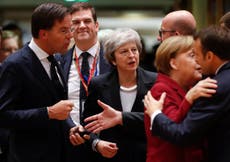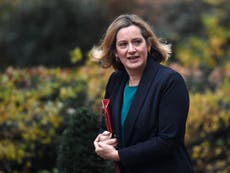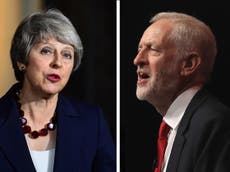Labour is backing away from a new referendum – could enough of its MPs really end up supporting May’s Brexit deal?
Angela Rayner, the shadow education secretary, said a second referendum ‘undermines democracy’

The most important question this week was asked by Catherine West, the Labour MP. She asked Theresa May on Wednesday: “Can the prime minister confirm which of these is worse: no deal or no Brexit?”
May didn’t answer, naturally. It is not that she is nebulous but that she is closed. She never wants to tell anyone her second preference in case it undermines her first.
But she almost certainly believes leaving the EU without a deal would be worse. Never mind her recent claim that a no-deal Brexit would “not be the end of the world”. That was a pose before the withdrawal agreement was finalised.
If she cannot get that deal through parliament, I think she would rather postpone Brexit and put it to the people in another referendum – although it would be another of those choices that leaders often face, of having to cut off their arm or their leg.
That is the choice that faces a lot of MPs as they get nearer to the fork in the road of history.
If the prime minister wants to avoid a no-deal Brexit, it is in her power to do so. She can change the exit day in the EU (Withdrawal) Act and ask the other EU leaders for a delay, to which they would probably agree if it were for the purpose of holding a referendum. If they refused she could simply revoke the UK’s notice of intention to leave, as the European Court of Justice confirmed on Monday.
There would be nothing her dissident MPs could do to stop her, having come for the crown and missed on Wednesday.
That means, then, that the fork in the road is two-pronged not three-pronged. The choice is May’s deal or a referendum. No wonder Jacob Rees-Mogg looks so cross. But it is Labour MPs who would then face the most difficult choice.
That is why the most significant thing that happened this week, after the vote of confidence in May, was Angela Rayner, the shadow education secretary, appearing on BBC Question Time on Thursday. A second referendum “undermines democracy”, she said. “People made the decision and you can’t keep going back saying, ‘Would you like to answer it a different way?’”
If you go through the 25 members of the shadow cabinet it is not obvious that there is a majority for a referendum there. If there were no chance of a general election and Labour were forced to choose, which way would it go?
John McDonnell, the shadow chancellor, said two weeks ago that, if an election is not possible, “We’ll be calling upon the government then to join us in a public vote – it’s difficult to judge each stage, but that’s the sequence I think that we’ll inevitably go through over this period.”
That doesn’t sound nebulous, but then you have to remember that Labour has no position on whether remaining in the EU should be one of the options on the ballot paper in a referendum. I’m not sure McDonnell’s real preferences are any clearer than May’s.
And I wonder if the wind is changing direction at Westminster. Rayner’s words were the biggest straw, but others include my conversations with ultra-Remainer Labour MPs in Leave-voting seats, who are uneasy about a referendum. Then there was Charlie Falconer, former cabinet minister and one of Tony Blair’s oldest friends, disagreeing with him on this question. “Forging a consensus for all out war in a second referendum is disastrous for the UK,” he said today. “Forging a consensus in the Commons for a sensible Brexit is beneficial for the UK.”
He doesn’t have a say, but he gives voice to an opinion that hardly dares to be heard among pro-EU Blairites.
The one thing the doubters keep coming back to is the question of the question. If there were to be a referendum, no one can agree what the question would be. A three-option referendum – deal, no deal and Remain – would pose two Leave options against one Remain. On the other hand a choice between two options would have to leave one out, which really would seem to undermine democracy, in Rayner’s words.
It is hard to say by what procedure parliament could possibly resolve the choice between May’s deal and a referendum. If there were a free vote in parliament on a straight choice between the two I don’t know which way it would go, but the prime minister’s deal is not a dead letter yet.






Join our commenting forum
Join thought-provoking conversations, follow other Independent readers and see their replies